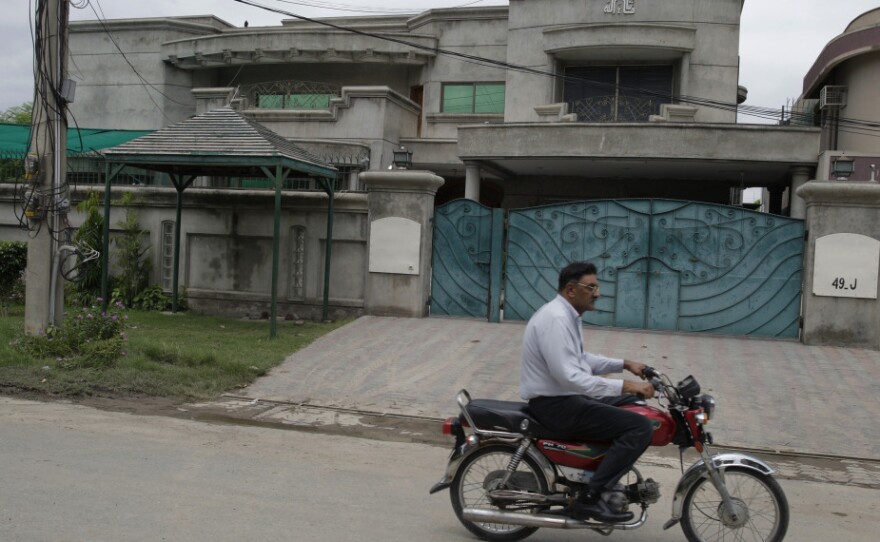In Pakistan, several high-profile kidnappings reveal the cunning of the captors and confusion among police.
American aid expert Warren Weinstein was seized from his home in Lahore in mid-August. Two weeks later, publishing scion Shahbaz Taseer was snatched from his Mercedes at gunpoint, also in an upscale neighborhood of the Punjab capital.
The trail is leading investigators to Pakistan's militant-dominated tribal areas. North Waziristan, on the lawless Pakistan-Afghanistan border, is now believed to be a destination of choice for militant kidnappers.
A new video shows a Swiss couple snatched in July from southwest Pakistan. In the video, the couple — now believed to be in the northwest tribal belt — speaks calmly and calls on Pakistan and Switzerland to meet their captors' demand: the release of a Pakistani scientist, Aafia Siddiqui, who is alleged to have ties to al-Qaida and is jailed in the U.S. The masked gunmen pointing rifles at the heads of the couple leave no doubt that their lives are in danger.
There has been neither public demand nor public confirmation about the condition of 70-year-old Weinstein, however. The same is true for Taseer, the wealthy son of a leading progressive politician assassinated earlier this year, Punjab Gov. Salman Taseer.
Who Are The Kidnappers?
Punjab Law Minister Rana Sanaullah says Lahore-based criminal elements carried out the kidnappings then likely handed Taseer and Weinstein off to any one of a dozen militant groups with whom they work. He says Pakistan's military spy agency — the tight-lipped Inter-Services Intelligence — has taken charge.
"The terrorists are in negotiation with the families of the victims. I can say this," he says.
Kidnappers are looking for money and nothing else, Sanaullah says. What's new is that they demand such a huge amount.
Sanaullah says captors have set a ransom of more than $1 million — an astronomic sum in Pakistan — for the son-in-law of Pakistan's former chairman of the Joint Chiefs of Staff Committee, who was kidnapped in August last year.
It is worrisome in the case of Weinstein, believed to suffer ill health, that there has been no public demand for money, a prisoner exchange or even proof that he's alive.
Rashed Rahman, editor of the Daily Times, says the method of operation of the kidnappers is usually to allow some time to elapse to build psychological pressure and put the hostage-takers in a better bargaining position.
"They themselves put a lid on all information to ensure that if there are any negotiations going on [that] they are not prematurely revealed, which might set off alarm bells and queer the whole pitch," Rahman says.
In Pakistani culture, kidnapping has long been used to settle scores. It's become more menacing in recent years as the nexus between criminal gangs and militants strengthens. Senior retired police officer Pervaiz Akbar Lodhi says kidnapping is the easy part. More complicated is keeping the victim hidden and healthy.
"Only organized criminals, only organized parties ... these terrorist organizations, they have means to do that," Lodhi says.
Lodhi says sophisticated kidnappers such as the Pakistan Taliban capitalize on the isolated tribal areas to sequester their victims in their own infrastructure. But he says it's entirely possible that Weinstein and Taseer are no longer in Pakistan, but in Afghanistan.
The mysterious abductions coincide with surging crime, a plunging economy and a militancy that seems as resilient as ever.
The Feeling On The Streets
On the streets of Lahore, choked with animals and smoke-spewing motorcycles, people complain that criminals have been emboldened by the state, which they say is unwilling or unable to protect them. Mohammad Akram, who sells textiles from a stall near the old city, says there is no law and order.
"There is no security. Here, God is the protector of everyone," says Akram, 56. "The government has failed, and anybody could be kidnapped. We are sitting on this road and anybody could do anything to us."
Rahman says the unsolved kidnappings of foreigners and the affluent are troubling, but the police and intelligence agencies can't be everywhere.
"[They] cannot guard every son of the rich all over the country," he says. "It's not possible, physically not possible, given also the fact that we are undergoing threats of and actual attacks by terrorists. So they are stretched."
Retired law enforcement officials admit that the police are not professionally trained to fight terrorism, nor do they compare to their counterparts in the U.S. Authorities, however, report that of the 45 cases of kidnapping in Lahore this year, all but seven have been resolved.
Copyright 2022 NPR. To see more, visit https://www.npr.org. 9(MDAzMjM2NDYzMDEyMzc1Njk5NjAxNzY3OQ001))







